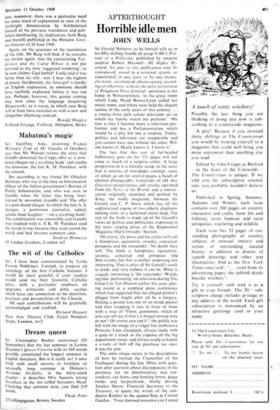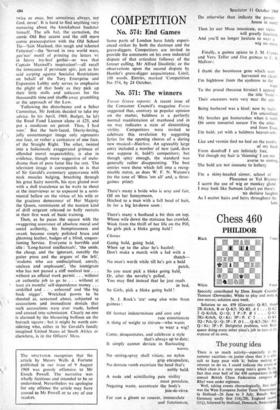AFTERTHOUGHT
Horrible idle men
JOHN WELLS
Sir Gerald Nabarro, as he himself tells us in his fifty-shilling bundle of scrap NAB 1, Por- trait of a Politician, published by surprise surprise Robert Maxwell—All Rights Re- served. No part of this publication may be reproduced, stored in a retrieval system, or transmitted, in any form or by any means, electronic, mechanical, photocopying, record- ing or otherwime, without the prior permission of Pergamon Press Limited—possesses at his home in Worcestershire, 'in the great room which Lady Maud Bowes-Lyon called her music room, and where were held the elegant soirees of the early years of this century ... a twenty-three inch colour television set on which my family watch me perform.' My fear is that I become more a television per- former and less a Parliamentarian, which would be a pity but not a surprise. Today, politics and television are inseparable and you cannot have one without the other. Wil- son knows it. Heath knows it. I know it.'
The fact that this sort of fat-headed buffoonery goes on for 331 pages will not come as much of a surprise either. A large proportion of it is literally scrap, in the sense that it consists of newspaper cuttings, some of which go on for several pages, a batch of election photographs, transcripts of old Any Questions programmes, old articles reprinted from the News of the World, and a conver- sation originally recorded and printed by King, the nudie magazine, between Sir Gerald and C. P. Snow which has all the sophisticated repose of two elderly elephants locking tusks in a darkened china shop. The rest of the book is made up of Sir Gerald's views on politics and politicians, expressed in the terse, rasping prose of the Regimental Magazine Old Comrades' Section.
'Of course, the press and the critics will call it bumptious, egocentric, swanky, conceited, pompous and the remainder'. No doubt they will. The book is bumptious, egocentric, swanky, conceited and pompous (the SPECTATOR), but that is neither surprising nor interesting. That is after all Sir Gerald's stock in trade, and very tedious it can be. What is vaguely interesting is 'the remainder'. Watch- ing him 'performing' on television during The Great Car Tax Illusion earlier this year. glar- ing round at a sceptical press conference which had suggested that the alleged printer's alleged form might after all be a forgery, flicking a pound note out of an inside pocket and then snapping it taut in front of them with a roar of 'There, gentlemen, which of you can tell me if that's a forged pound note or not? Of course you can't !', the public was left with the image of a vulgar but inoffensive Petticoat Lane cheapjack, always ready with a quip or a crack at the expense of the big department stores, and always ready to knock a couple of bob off the purchase tax since it was for you.
The same image recurs in his descriptions of how he twitted the Chancellor of the Exchequer during the late 'fifties with ques- tion after question about discrepancies in the purchase tax on doorknockers and nut- crackers, car horns and hunting horns, piggy banks and harpsichords, finally driving Jocelyn Simon. Financial Secretary to the Treasury, to quote the words of the con- ductor Richter to the second flute at Covent Garden : 'Your damned nonsense can I stand twice or once, but sometimes always, my God, never'. It is hard to find anything very menacing about the knockabout huckster himself. The silk hat, the carnation, the comic Old Boy accent and the still more comic preoccupation with the Old School Tie—Tain Macleod, this tough and talented Fettesian'—the 'Served in two world wars, guv'nor' motif of printing the letters vc in heavy ivy-leaf gothic--or was that Captain Maxwell's inspiration?—all recall the innocuous if persistent spiv, just as his acid carping against Socialist Restrictions on behalf of the Tory Enterprise and Expansion Lobby only serves to emphasise the plight of that body as they pick up their little stalls and suitcases for the thousandth time and shuffle away grumbling at the approach of the Law.
'Followings the disturbance and a Select Committee, Mr Jenkins decided to take my advice. In his April, 1969, Budget, he left the Road Fund Licence alone at £25, and put a modicum on petrol. Thus, I had won.' But the bare-faced, liberty-loving, jolly costermonger image only represents one face, or rather a caricature of one face, of the Straight Right. The other, twisted into a ludicrously exaggerated grimace of offended moral respectability, is also in evidence, though more suggestive of melo- drama than of pure farce like the rest. The television image it corresponds to is that of Sir Gerald's customary appearance with neck muscles bulging, breathing through his great hairy nostrils, his eyes glazed over with a dull truculence as he waits to shout at the interviewer or to expound in a senti- mental bellow on the virtue of his wife or the gracious demeanour of Her Majesty the Queen, reminiscent of the nastiest kind of drill sergeant released ,to bully recruits in their first week of basic training.
Then, as he paces the square with the swaggering assurance of absolute moral and social authority, his bumptiousness and swank become simply polished brass and gleaming leather, badges of a blind, unques- tioning Service. Everyone is horrible and idle : Tong-haired intellectuals', 'the snide, the cheap, and the ignorant, notably the gutter press and .the organs of the left', 'students who are undisciplined, unruly, unclean and unpleasant', 'the immigrant who has not passed a stiff medical test. . . without an official work permit. . . without an authentic job to go to . . . without at least six months' self-dependence money . . . unskilled and . . . coloured' and 'the big buck nigger'. Wretched pawns to be shouted at, screamed about, subjected to accusations and immeditate denials that such accusations were ever made, lashed and coaxed into submission. Clearly no one is alarmed by the blustering buffoon on the barrack square : but it might be worth con- sidering who, either in Sir Gerald's fondly imagined United States of South Africa or elsewhere, is in the Officers' Mess.











































 Previous page
Previous page